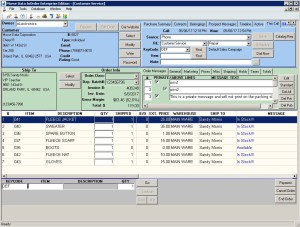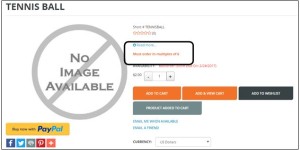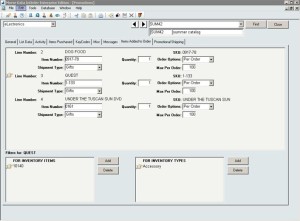Category: ERP Business Software
4 Measures to Combat eCommerce Fraud and Theft
Mobile fraud is on the rise, and, as is the case with your eCommerce shopping website, your mobile eCommerce site requires vigilance to protect your customers’ sensitive data – especially when processing orders. Be sure you have measures in place to reduce mobile fraud, and train your employees to recognize signs of fraud. Your ERP system can also be a valuable weapon against would-be thieves and costly credit card chargebacks from fraud attempts.
Be sure you have these prevention measures in place to combat mobile fraud.
Fraud Scoring
To decrease fraudulent orders from being processed, use your ERP system to assess orders as they are received based on a variety of criteria known to indicate fraudulent purchases. This may include whether or not an item is considered risky, or even an area where orders are shipped. Simply knowing where fraud occurs can help protect your customers, so using address validation services is also helpful.
Integrated Solutions
Nobody wants to think that trusted partners are stealing from them – whether they’re shoppers, employees, or even vendors. But fraud and theft doesn’t only come from outside sources. Check your ERP system’s audit logging for dates, user names, and tasks each user performs. This enables you to isolate and trace other types of theft, such as generation of bogus customer refunds, gift cards, or credit memos.
Your ERP system’s Purchasing, Payables, and Inventory systems are all connected, so you can compare what was ordered – to what was received – to what you are paying your vendors.
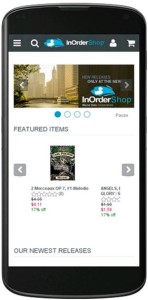 The best eCommerce systems use responsive design for mobile web using Google’s recommended responsive design pattern. With this design, a single cart functions for both PC and mobile, with a similar look and feel, regardless of device size, no longer requiring multiple web sites. What this means for fraud protection is that you don’t have to worry about carrying out the same protection measures on separate systems.
The best eCommerce systems use responsive design for mobile web using Google’s recommended responsive design pattern. With this design, a single cart functions for both PC and mobile, with a similar look and feel, regardless of device size, no longer requiring multiple web sites. What this means for fraud protection is that you don’t have to worry about carrying out the same protection measures on separate systems.
Training
Your employees play a significant part in protecting your business against fraud and theft. However, if they don’t know what to watch for, what to protect, or how, then how can they help you? One way is to follow your procedures. Define a security policy, tell your employees about it, and train them on it.
Stronger Security Measures
If you’re thinking about accepting credit card payments, you must make sure your system meets specific security standards to protect sensitive data. The PCI Security Standards website is a good place to start for information. If you currently accept credit card payments, you already know that your ERP system is PA-DSS-Validated to meet your PCI-DSS requirements.
When you protect against fraud and theft, your employees, vendors, and customers discover that they can trust you. With their trust comes respect and confidence that your business will continue to grow. Use these measures to improve and protect your customers’ shopping experience, achieve their trust, and prove that you take them seriously.
Contact us for a free demo of how InOrder’s eCommerce system helps combat eCommerce fraud and theft.
Get Your Wholesale Shopping InOrder
InOrder provides support for wholesale ordering, including wholesale orders that require items to be ordered in multiples of the item quantity per carton.
Whenever a line item is added to an order, it is checked to determine if wholesale ordering is in effect. If it is, then the quantity ordered must be a multiple of item carton quantity. The item quantity is rounded up to the carton quantity, and a line item message indicates that the line item was rounded up. A popup alert may also be displayed.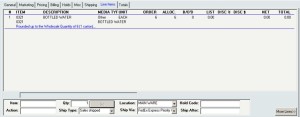
Enforcement of wholesale order requirements may be changed at the line item level. When this setting is changed on the order and one or more line items already exist, line items that are already on the order are not affected. Therefore, this setting can be temporarily bypassed by turning it off, adding the line item, and turning it on again. This allows special overrides, when necessary, at the line item level.
This feature is also supported for Electronic Order Filling and EDI orders. On the web site, the Item Details page is also designed to show a message if there are wholesale ordering requirements for the item. You can customize this message with a simple configuration setting.
For more information about wholesale shopping with InOrder, please contact sales@morsedata.com and ask for your free demo.
Do You Need an ERP System?
An Enterprise Resource Planning (ERP) system commonly integrates information across the organization. This system, which relies on a single database, automates the flow of information within the system.
Most systems are modular and allow you to add modules as you grow. Modules are usually tightly integrated; an update in one module often affects information in other modules. The modules all carry a consistent look and use the same layout.
In the past, ERP systems were for very large enterprises. In the last decade, systems have been designed for smaller businesses.
What are the Benefits of an ERP System?
A well-designed ERP system usually incorporates many aspects of a business – from CRM, order management and the supply chain to sales, accounting and marketing. It integrates all of your separate, divided systems and processes into one unified system.
A typical ERP system can manage your inventory and warehouse functions, process orders and payments, drive business growth with promotions and other marketing efforts, and protect customer data. It can even manage commissions, royalties, and contracts, help with job costing, and so much more.
An ERP system can give you a more clear view of your business. It can eliminate old and outdated systems, as well as manual and paper processes, while providing more efficient operations across your enterprise.
What Next?
First, make a list of your business processes and what you’d like an ERP system to have. You’ll want a system that can easily create reports and provide access to current documentation. Do you need inventory or warehouse management? Do you want your Customer Service Reps to help grow your business? Do you want a real-time shopping cart? Decide what you need, and what you want to accomplish.
Then, request a free demo to see if InOrder is right for you.
Offer Coupons to Your Customers with InOrder
Coupons, promotions codes, sales, and special offers are proven ways to significantly influence purchases. Consumers will even use them to plan what they buy, where they will buy it, and when.
With InOrder ERP, you can add special offers to your InOrder Marketing Promotions. Define general perpetual use and once-per-customer coupon codes that can be used with your promotion for a fixed amount off, a free item, or promotional shipping.
Use InOrder’s Coupons and Offers Processing with the InOrder Marketing Module for the following functionality:
- Link no charge or discounted line items to promotions.
- Offer continuity series for customer sign-up.
- Add Buy-One-Get-One items to the order whenever another specific item is added to the order. This feature can also be used for Buy-One-Get-Two, Buy-X-Get-X, or even Buy-X-Get-1 offers.
- Add line items to an order when any item from a category or list of inventory items has been ordered.
- Offer promotional shipping charges, such as free or fixed price shipping. These offers may be tied to requirements such as ordering specific items or items from a product group.
- Use coupon items as triggers for the above offers.
- Add fixed price discount coupons to orders.
- Set up offers as single use per customer, single use per order, Buy-One-Get-One, or Buy-X-Get-X.
Contact us to schedule a free demo to see InOrder’s Coupons and Offers Processing in action.
What to Look for When Selecting the Perfect ERP Vendor
Selecting a vendor is as important as selecting an ERP system. ERP vendors must be experts in their field and, to an extent, yours. They must also be professional and available when you need them, and provide clear communication to keep you informed of important changes. Here are important things to consider about potential vendors when evaluating ERP systems.
- What is the implementation process? Is there a dedicated Project Manager who is readily available? The implementation of an ERP System is a large undertaking that needs careful planning with the proper time and resources allocated to avoid surprises during Go-Live. Since this is not something your company does on a periodic basis, a number of unknowns could end up causing you a lot of unnecessary problems and expense. Be sure the vendor has plenty of experience.
- What is the vendor’s availability for support? This indicates how responsive the vendor will be when you have questions or need assistance. How often is the system upgraded and what is involved? It is important that your system always has the latest updates for security and functionality – without disrupting your business.
- What about references? Request them and follow up on them. Reviews for vendors are as important as they are when shopping online. Experience with your industry is a plus.
- What types of communication are provided? Notices of updates are important for security and training, as well as details about what’s in each update. General information about the system is always helpful, and of course, documentation on how to use the system is a must. It is beneficial to you when the vendor is actively in touch and keeping you informed.
Make sure you can work with the vendor to get what is important to your business within a specific time-frame. Top-notch support is key. It takes commitment – not only during implementation, but for the life of the system.
To help with a smooth implementation, follow these tips from things we’ve learned over the years. And when you’re ready to check out ERP systems, contact us for a free demo of InOrder.
5 Tips for eCommerce Implementation
Few people like change, but when something isn’t working as needed, it might have to go. This is true for cars, computers, phones, and even systems that drive your business. Shopping is just one step in the process of replacing a new eCommerce Platform. Once you find it, the real work begins. Here are 5 tips to help you stay focused for success.
- Identify your objectives and tasks, and assign a unique priority to each task. This helps to quickly identify which tasks must be completed before others, and which can wait until the next phase, if necessary. This is especially helpful if time is tight.
- Identify individuals responsible for each task, and assign those responsibilities to each of them. Identify deadlines for decisions and make clear the consequences of not meeting those deadlines. It’s also a good idea to assign one person to communicate between all parties involved, to avoid any misunderstanding or miscommunication between those indirectly involved and those directly involved in the project.
- Make a schedule for the project that includes each task you identified. Include time for unexpected work or delays. (Our white paper “Ten Tips for a Successful ERP Implementation” recommends 25%.) As the project moves along, monitor the progress of each item on the schedule. If anything is not completed on time, find out the reason for the delay, and make sure it is corrected so it can get back on target. If a new task is discovered during the project, assign it its own priority and adjust your schedule accordingly, or begin a new list for tasks that can wait until the next phase. Remember that you included time in your budget for unexpected work and delays, so use it if necessary, or add to it if an item is completed in less than the time originally scheduled. Regularly notify everyone involved of the progress.
- Focus on the objectives and reasons for the upgrade. As you make progress, it might be necessary to maintain a “punch list” of important items or requests that have been identified since the project began.
At this point, it might be appropriate to re-assign individuals and their responsibilities, as determined by your new list. Again, assign a priority and make a schedule for each item on the new list. Check the progress of each item, and update the list/schedule as appropriate. As with your first schedule, regularly notify everyone involved of the progress.
- Help your staff understand the benefits of the new system, both to them and to the company. Before implementation, give them time to accept the new system and become comfortable with it. Identify any new processes, new responsibilities, and questions about the new system. Document them, and train your staff. Make sure everyone involved knows the processes, their responsibilities in those processes, and how to accomplish them with the new system.
Change doesn’t have to be painful, especially when it’s needed to help improve your system. Keeping sight of priorities, staying organized, and clear communication are key elements for successfully growing your business.
Contact us for a free demo to see how InOrder’s eCommerce platform can help your business.
Prioritize These Requirements to Help Choose Your New ERP System
When looking for a new ERP System, wouldn’t it be nice if you were up and running fast, the system was affordable, and it actually fulfilled all of your business needs? It isn’t easy to find it all in one package. So, when looking for your new system, you might be tempted to settle for less, which could cause problems in the long-run.
So what do you do?
It’s helpful to prioritize your requirements so you can track what’s most important to your business. Try organizing your requirements into small groups. Here are some examples to think about.
- Affordable & Fast – This is important when you need something quickly and within your budget. You can use the system “out of the box” with no immediate custom programming. This option gives you time to work with the system and add to it as your business grows.
- Fast & Meets Your Needs – This is useful when you can work with the vendor to get what’s important to your business within a specific time-frame. Top-notch support is key.
- Meets Your Needs & Affordable – This option can also give you time to work with the system before customizing. This is great when you have time for implementation and can think about custom features.
When searching for a new ERP system, all three of the above are important considerations, and none of them should be overlooked.
I think everyone agrees that there is no substitute for Quality. Make sure the system can growth with your business, at the pace of your business. And be sure to choose a dedicated Team with great leaders who are there to support you.
Request a free demo to see how InOrder meets ALL of your requirements!
3 Tips for B2B Integration When Planning Your ERP Implementation
The complexities of integration has led some to classify “best of breed” as a passing fad. Having a system that already tightly integrates your Order Management System (OMS), Customer Service, Warehouse Management System (WMS), A/R, A/P, Marketing and Email campaigns, and especially your eCommerce, is more valuable than previously thought. These enterprise-level systems have definitely come of age, minimizing the need for so many critical integrations and allowing you to focus on the integrations that are truly necessary areas of system specialization.
In more than three decades, the biggest mistake we see companies make is to not create an action plan that covers all aspects of the implementation. When it comes to B2B integration, here are three simple things to consider when planning your ERP implementation.
- Any time you are dealing with third parties / additional software interfaces, this often introduces unexpected obstacles and delays from simple things, such as point of contact vacation schedules, to mapping mismatches due to terminology misunderstandings, to more complex issues, such as errors in an integration partner’s API documentation. Allocate resources to integrate with any business partners you have (shippers, payment gateways, trading partners, etc.). Schedule these activities during the planning stages to avoid delays, unexpected expenses, and customer service issues.
- Consider any new partners and service providers that are not part of your current processes before implementation. With all the new processes, training, data conversion, and other activities, they could easily be overlooked if they’re not included in your implementation plan.
- When planning your implementation schedule, keep in mind the schedules of your service providers. If they need to make any adjustments, test, or assist in any way, they may also need time that could cause your schedule to be adjusted.
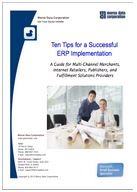 For more valuable information about Implementing your ERP system, download our “Ten Tips for a Successful ERP Implementation” paper.
For more valuable information about Implementing your ERP system, download our “Ten Tips for a Successful ERP Implementation” paper.
Whether you’re considering a new ERP system or you’re just beginning an implementation, this paper will help you keep your implementation within budget and on time.







